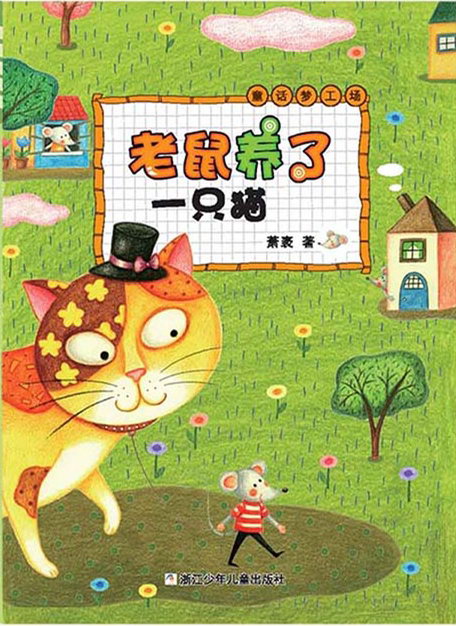
The Mouse Raised a Cat is by Xiao Mao“Fairy Tale Dream Factory”A collection of fairy tales in25In this exquisite and short fairy tale, some important characters in Xiao Mao’s fairy tale world — Baby Pig, Bobo Bear, Anmi, Frog and Little Fish, Taotao and Mili, etc. — appeared on the stage one after another, performing innocent, cute, humorous and witty little stories.
At first glance, this is a rather plain book, without fancy binding or exaggerated recommendations. But upon closer inspection, the illustrations are lovely and appropriate, the typesetting is loosely spaced, and pinyin is provided, showing consideration for young readers at every turn. But more importantly, once you start reading this fairy tale collection, young readers will likely be deeply attracted.
In the opening chapter “Referee”, the piglet is invited to be the referee of a running race. The contestants include two-legged chickens, ducklings and geese, four-legged puppies, kittens and bears, as well as six-legged and eight-legged animals…42A centipede with only one leg also competed. The audience cheered, thinking, “The more legs, the faster it must run!” But it turns out that the little flower snake, with no legs, won! This story showcases the typical characteristics of Xiao Mao’s fairy tales: clever creativity, seamless integration of knowledge, humorous expression, vivid imagery, an almost natural childishness, and a touch of philosophical interest, which also allows adults to have some room for reflection.
Read on, and as each story unfolds, you will find that the various characters in Xiao Mao’s fairy tale world have distinct personalities: the baby pig is a simple, kind-hearted optimist; Bobo Bear is good at everything except his love for honey, he is smart, curious, and willing to explore everything, so the little fox and the big bad wolf who are related to him also appear to be infinitely creative; the naughty frog and the beauty-loving little fish have an enviable and sincere friendship, and their pursuit of beauty can be called romantic; the friendship between the mouse Mi Li and the puppy Tao Tao is also quite peculiar, and this special combination always encounters unexpected new things; and the boy An Mi is like an alien living on Earth, and he is always involved in events that shock the universe.…What a rich and wonderful world this is!
In the fairy tale that serves as the title of this book, Mili and Taotao adopted a cat that was called “Tasting Brand Cat Food”.”Zhang Maomao, the spokesperson for the film, is actually the celebrity cat, tired of her life without freedom, and decides to become a normal cat with an owner, even if that owner is a mouse or a puppy. However, as their love grows, the cat finds it increasingly difficult to suppress her instinct to eat the mouse, so she resolutely decides to leave and become a free stray cat. This is a fairy tale with a distinctly modern perspective, and the author cleverly incorporates elements of real life, painting a beautiful picture while not shying away from the sometimes harsh realities of relationships.
However, no matter how many modern elements he introduces into his works, Xiao Mao always maintains the romantic tradition unique to fairy tales. In “The Adventures of Nine Little Mice,” the beauty-loving mother mouse devotes herself to dressing her children, turning them into the most beautiful little mice in the world. All animals marvel at their beauty, and the warring parties stop fighting because of their appearance. Even their natural enemy, the cat, learns sympathy and pity… In the end, the father mouse sighs:“I never thought that beauty could change the world!”
Yes, this romantic tradition is also the ideal of fairy tales. No matter how helpless we are in the fantasy world or the real world, we must ultimately promise our children that they will live happily together from now on.…
Only by believing can you truly achieve it.
Children’s reading promoter Ajia
2014Year4Moon in Beijing